2019年春七年级英语下册Unit12Whatdidyoudolastweekend第5课时SectionBSelfCheck课堂练习新版人教新目标版
2019年春七年级英语下册 Unit 12 What did you do last weeke

Unit 12 What did you do last weekendSectionB(1a-1e)知能演练提升Ⅰ.根据句意及图画内容填写单词,每空一词1.They a kite last Sunday.2.Gina had with her friends yesterday evening.3.Did Jim swim in the pool?4.Peter for a test last weekend.5.Lily did something interesting to relax herself.She the guitar. Ⅱ.单项选择1.I bought some gifts and my aunt.A.visitB.seeC.visitedD.saw2.— went to the zoo with Jack?—His friends.A.HowB.WhereC.WhenD.Who3.—Where she on vacation?—She her uncle’s house.A.did; go; went toB.does; go; went toC.did; went; went toD.does; went; go to4.—?—Very interesting.I liked it very much.A.Did you have a bookB.Was the trip relaxingC.What did you think of the movieD.How did you like the people there5.After dinner,he stayed at home and played violin.A.the;/;theB./;/;theC./;the;/D.a;the;theⅢ.短文填空,每空一词Yesterday I 1. up 2. six 3. the morning.I had milk and bread 4.breakfast.After that I 5. to school by bike.When I reached school, it was seven twenty.We had four 6..In classI7.hard.I had fried fish and some rice for 8.atschool.In the afternoon I 9.soccer for an hour.Then I 10.my homework.参考答案知能演练·提升Ⅰ.1.flew 2.dinner/supper 3.swimming 4.studied 5.playedⅡ.1.C 2.D 3.A 4.C 5.BⅢ.1.got 2.at 3.in 4.for 5.went 6.classes 7.studied/worked 8.lunch 9.played 10.did。
七年级英语下册Unit12Whatdidyoudolastweekend之主要知识点
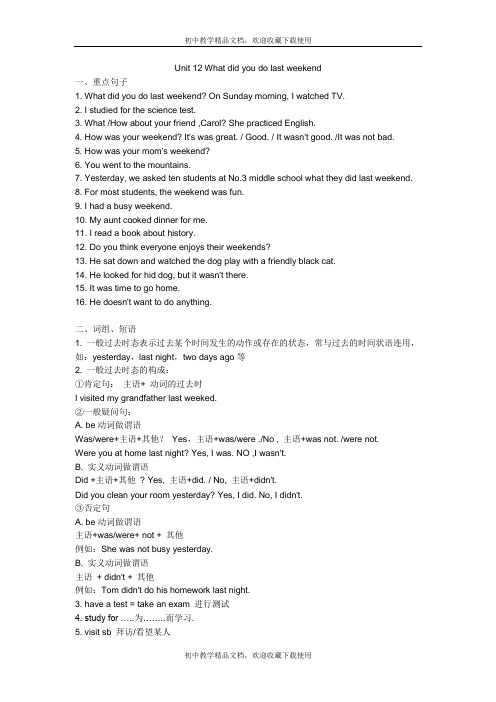
Unit 12 What did you do last weekend一、重点句子1. What did you do last weekend? On Sunday morning, I watched TV.2. I studied for the science test.3. What /How about your friend ,Carol? She practiced English.4. How was your weekend? It's was great. / Good. / It wasn't good. /It was not bad.5. How was your mom's weekend?6. You went to the mountains.7. Yesterday, we asked ten students at No.3 middle school what they did last weekend.8. For most students, the weekend was fun.9. I had a busy weekend.10. My aunt cooked dinner for me.11. I read a book about history.12. Do you think everyone enjoys their weekends?13. He sat down and watched the dog play with a friendly black cat.14. He looked for hid dog, but it wasn't there.15. It was time to go home.16. He doesn't want to do anything.二、词组、短语1. 一般过去时态表示过去某个时间发生的动作或存在的状态,常与过去的时间状语连用,如:yesterday,last night,two days ago等2. 一般过去时态的构成:①肯定句:主语+ 动词的过去时I visited my grandfather last weeked.②一般疑问句:A. be动词做谓语Was/were+主语+其他?Yes,主语+was/were ./No , 主语+was not. /were not.Were you at home last night? Yes, I was. NO ,I wasn't.B. 实义动词做谓语Did +主语+其他? Yes, 主语+did. / No, 主语+didn't.Did you clean your room yesterday? Yes, I did. No, I didn't.③否定句A. be动词做谓语主语+was/were+ not + 其他例如:She was not busy yesterday.B. 实义动词做谓语主语+ didn't + 其他例如:Tom didn't do his homework last night.3. have a test = take an exam 进行测试4. study for …..为……..而学习.5. visit sb 拜访/看望某人6. go to + 目的地go to Beijing去北京go home回家go there到那儿go here 到这儿注意:home,there,here是副词,副词前不加任何介词。
2019版七年级英语下册 Unit 12 What did you do last weekend教

Unit 12 What did you do last weekend?课题Unit 12 What did you do lastweekend? 课时第一课时 Section A(1a-2d) 课型New教学目标知识目标1. 学习并掌握下列词汇和短语:camp, lake, beach, badminton, sheep, as, natural, butterfly,visitor, tired, stay, stay up late2. 掌握以下句型:①—What did you do last weekend, Lucy?—I went to summer camp.②—How was your weekend?—Pretty good, thanks.③—I worked as a guide at the Natural History Museum.④—How interesting!能力目标了解以下语法: Learn to talk about recent past events.情感目标1. 帮助学生树立合作学习观点。
2. 讲述美好的周末, 树立学生享受生活, 热爱美好的大自然情感。
教学重点1. Key vocabulary.2. Talk about recent past events教学难点1. Talk about recent past events2. Practice students’ listening, speaking, reading and writing skills. 课前预习Preview the new words教学方法Situational approach; Listening and speaking approach;municative approach教学过程教学环节教师活动学生活动备课札记Step 1 Warming-up and revision 1. Point to the previousSaturday and Sunday on a wallcalendar and ask Ss to tell1. Look at the wallcalendar and tell somethings that were done复习学过的描述动作的词汇, 为接下来的学习作铺垫; 并通过即兴发some things they did last weekend.Say like this: Saturday and Sunday are the weekend. This is last weekend. Then tell some things you did last weekend such as, cleaned my house on the weekend. 2. Use quick sketches (in the board) along with gestures to demonstrate the meaning of each activity.last weekend. 2. Remember the meaningof each activity. 言激发学生的学习兴趣。
七年级英语下册Unit12Whatdidyoudolastweekend重点单词及句型背诵默写
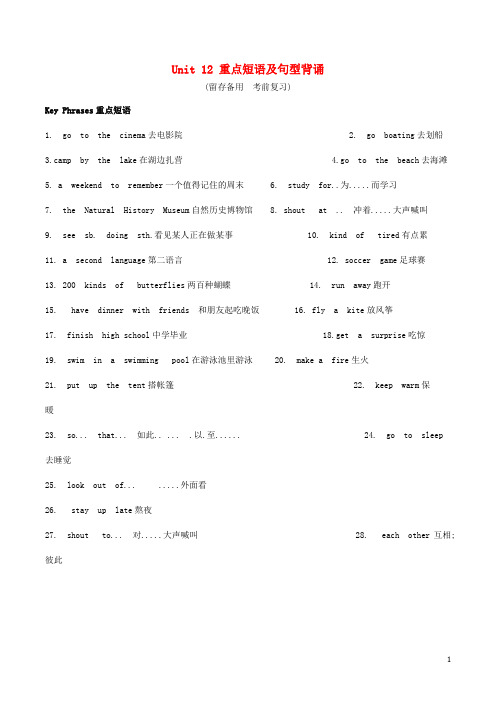
Unit 12 重点短语及句型背诵(留存备用考前复习)Key Phrases重点短语1. go to the cinema去电影院2. go boating去划船3.camp by the lake在湖边扎营4.go to the beach去海滩5. a weekend to remember一个值得记住的周末6. study for..为.....而学习7. the Natural History Museum自然历史博物馆 8. shout at .. 冲着.....大声喊叫9. see sb. doing sth.看见某人正在做某事 10. kind of tired有点累11. a second language第二语言12. soccer game足球赛13. 200 kinds of butterflies两百种蝴蝶 14. run away跑开15. have dinner with friends 和朋友起吃晚饭 16. fly a kite放风筝17. finish high school中学毕业 18.get a surprise吃惊19. swim in a swimming pool在游泳池里游泳 20. make a fire生火21. put up the tent搭帐篷 22. keep warm保暖23. so... that... 如此.. ... .以.至...... 24. go to sleep去睡觉25. look out of... .....外面看26. stay up late熬夜27. shout to... 对.....大声喊叫 28. each other互相;彼此29. play badminton打羽毛球 30. wake... up把... ... 弄醒31. up and down上上下下;起伏 32. go camping野营Key Sentences 重点句型1. What did you do last weekend? 你上周末做了什么?2. How was your weekend? 你周末过得怎样?3.I worked as a guide at the Natural History Museum. 我在自然历史博物馆当过导游。
2019-2020学年人教新目标英语七年级下册Unit 12 What did you do last weekend?单元练习含答案
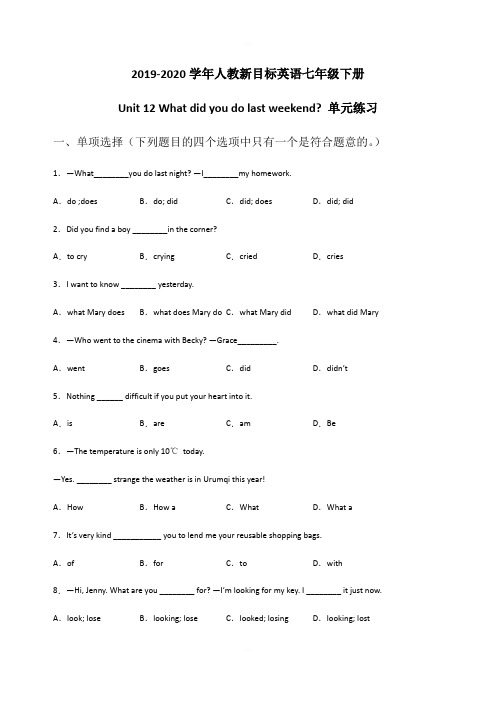
2019-2020学年人教新目标英语七年级下册Unit 12 What did you do last weekend? 单元练习一、单项选择(下列题目的四个选项中只有一个是符合题意的。
)1.—What________you do last night? —I________my homework.A.do ;does B.do; did C.did; does D.did; did 2.Did you find a boy ________in the corner?A.to cry B.crying C.cried D.cries3.I want to know ________ yesterday.A.what Mary does B.what does Mary do C.what Mary did D.what did Mary 4.—Who went to the cinema with Becky? —Grace_________.A.went B.goes C.did D.didn’t 5.Nothing ______ difficult if you put your heart into it.A.is B.are C.am D.Be6.—The temperature is only 10℃today.—Yes. ________ strange the weather is in Urumqi this year!A.How B.How a C.What D.What a7.It’s very kind ___________ you to lend me your reusable shopping bags.A.of B.for C.to D.with 8.—Hi, Jenny. What are you ________ for? —I’m looking for my key. I ________ it just now. A.look; lose B.looking; lose C.looked; losing D.looking; lost9.Our teacher told us it’s important ________ a second language.A.learn B.learning C.to learn D.learned10.—________ did you play with? —I played with my father.A.When B.How C.Who D.What11.—What do you do? —I work ________ an English teacher in a middle school.A.for B.as C.at D.to12.—________? —I camped by the lake with friends.A.What do you usually do on weekends B.Where do you goC.How was your summer vacation D.What did you do last weekend13.—Who went to the library with you yesterday? —________ .A.Tony does B.Tony is C.Tony did D.Tony doing14.We put up our tents and ________ a fire ________ us warm.A.make; keeping B.made; kept C.made; to keep D.making; to keep15.________ is very difficult ________ such a high mountain.A.This;to climb B.It;to climb C.This;climbing D.It;climbing二、完型填空Jim started painting when he was three years old and when he was five, he was already very good at it. He 16 many beautiful and interesting pictures, and people paid a lot of money for them. They said, “This boy is going to be 17 when he grows up, and then we’re going to sell these pictures for a lot more 18 .”Jim’s pictures were different 19 other people’s works, because he 20 painted on all of the paper. He painted on half of it, and the other half was always empty.“That’s very clever,” everybody said. “Nobody else does that like 21 !”One day, somebody bought one of Jim’s pictures and then said to him, “Please 22 me, Jim. Why do you paint on the bottom half of your paper, 23 not on the top half?”“Because I’m small,” Jim said, “and my brushes don’t 24 very high. That’s 25 I only paint on the bottom half of the paper.”16.A.painted B.bought C.found D.lost17.A.pretty B.funny C.famous D.lucky18.A.houses B.gifts C.food D.money19.A.of B.from C.in D.with20.A.ever B.already C.never D.with21.A.him B.us C.her D.them22.A.tell B.advise C.promise D.believe23.A.and B.but C.or D.because24.A.lie B.stand C.climb D.reach25.A.when B.where C.why D.what三、阅读理解Mr. and Mrs. Green lived in a big city, and one summer they went to the country(农村)for their holiday. They enjoyed it very much, because it was a quiet, clean place.One day they went for a walk early in the morning and met an old man. He lived on a farm, and he was sitting in the warm sun in front of his house. Mr. Green asked him, “Do you like to live in this quiet place?”The old man said, “Yes, I do,” Mr. Green said, “What are the good things about it?”The old man answered, “Well, the people here know each other. They often come and visit me, and I often goand visit them. And there are also lots of children here.”Mr. Green said, “That’s interesting. And what are the bad things?”The old man thought and thought and then said, “Well, the same things, are they?”26.Mr. and Mrs. Green _______ the country very much, because it was a quiet clean place. A.liked B.like C.lived D.live 27.One day they _____ for a walk early in the morning.A.went to B.went out C.went up D.went down 28.The old man ________ enjoyed the country.A.too B.very C.also D.much 29.The people in the country are very ________.A.friend B.friendly C.clever D.careful 30.The old man thought _______ and then said, “Well, the same things, are they?”A.quickly B.quietly C.hard D.Soon四、用括号内所给单词的适当形式填空。
人教版新目标七年级下学期Unit-12--what-did-you-do-last-weekend--知识点

Unit 12 what did you do last weekend?Section A 知识讲解一. last(1)last形容词“最后的,最末的”或者“紧接前面的,刚过去的”。
Today is the last day in the year.最后一天。
I didn’t sleep well last night. 昨晚(2)last副词,“最后地”,I’m the last one.最后一个。
(3)last 动词,“持续,继续,维持”等,The hot weather lasted a week.持续了一周。
二. camp(1)camp 动词,“扎营,搭帐篷”。
We go camping every summer.We walked all day and camped by a river at night.(2)camp 名词,“露营地,度假营”。
Let’s go back to the camp, it’s getting dark. 让我们回营地吧,天黑下来了。
根据汉语提示填空。
(1)When did you join the ______ ______ (夏令营)?(2)I like ______ ______ (去宿营)in the open air.3)We______(宿营)in the forest last night. (4)Let’s go back to the ______(营地)三. sheepsheep 可数名词,“绵羊”,复数还是sheep;goat指山羊。
How many sheep are there on your farm? 你们农场里有多少只羊?拓展:常见的单复数同形的名词还有:deer (鹿),fish (鱼),Chinese (中国人),Japanese(日本人)等。
四. byby介词, “在……旁边”,相当于beside。
Our teacher is sitting by the window.by与交通工具名词连用时,名词前不用冠词,意为“乘、坐、用”等。
七年级英语下Unit 12 What did you do last weekend作文

Unit 12 What did you do last weekend?一、话题分析本单元的话题是“周末活动”。
要求学生学会描述周末进行的活动。
写作时要注意以下几点。
1. 正确地表述各项活动;2. 正确使用一般过去时。
3. 要注意按照时间先后顺序描述在不同时间段发生的事情;4. 可在文章结尾适当表达自己的感受。
二、文章结构1. 时态:一般过去时2. 段落布局开篇点题 I was busy last weekend.具体描述具体活动总结全文 I was busy but happy. What about you?三、例题假如你是Laura,请根据下表提示,给你的好朋友Tina写一封信,告诉她你上Dear Tina,How’s everything going? I had a very busy Sunday. In the morning, I did my homework. After that, I began to clean my room. My parents were not at home. So I cooked tomato noodles for lunch by myself at noon. In the afternoon, I went to visit my grandmother and helped her wash clothes. Then I watched TV with her in the evening. I was a little busy but happy.How was your weekend? Please write to me soon!Yours,Laura。
2019版七年级英语下册Unit12WhatdidyoudolastweekendSectionB2

Ⅱ. 将下列句子补充完整 1. 我姐姐两周前高中毕业了。 My sister _fi_n_i_sh_e_d_ high school _t_w_o_ _w_e_e_k_s_ _a_g_o_. 2. 但是我太累了以至于我早早地睡了。 But I was _so_ tired _t_h_a_t I went to sleep early.
_fo_r_e_s_t _m__o_o_n_ _e_a_r _h_ig_h_ school _p_u_t _u_p_
9. 互相;彼此 10. 吃惊 11. 对……大声喊叫 12. 把……弄醒
_ea_c_h_other _g_e_t a _su_r_p_r_i_s_e shout_t_o_. . . _w_a_k_ea_w_ a big snake _sl_e_e_p_in__g near the fire. 4. 我爸爸开始在他们的帐篷里上上下下地跳。 My dad _s_ta_r_t_e_d_ _to_ _ju_m__p_ _u_p_ and _d_o_w_n_ in their tent. 5. 这对我来说是非常有用的一课。 This was a very _u_s_e_fu__l _l_es_s_o_n_ _fo_r_ me.
drink tea with milk.
A. In my opinion
B. To my surprise
C. At the beginning
【解析】选B。考查介词短语辨析。in my opinion 依 我看来;to my surprise 令我惊讶的是;at the beginning 一开始。句意:——你在英国的生活怎么样? ——和这 里的生活完全不一样。令我惊讶的是, 那里的人们喝加 牛奶的茶。故选B。
季七年级英语下册 Unit 12 What did you do last weekend课文重难点讲解(无答案)(新版)新人教版
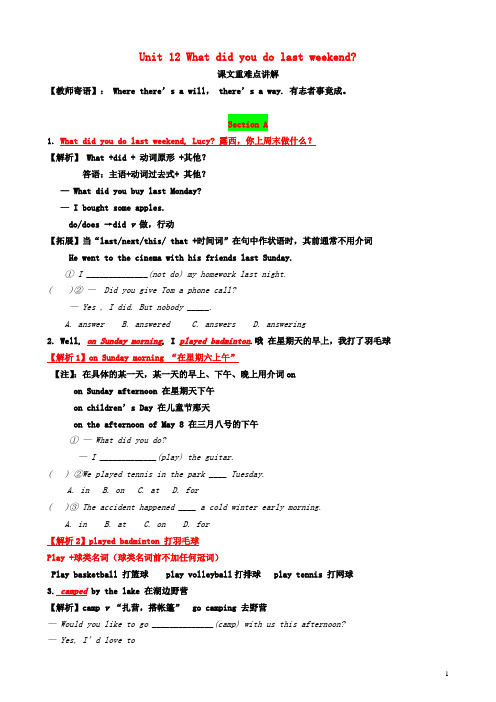
Unit 12 What did you do last weekend?课文重难点讲解【教师寄语】:Where there’s a will,there’s a way. 有志者事竟成。
Section A1. What did you do last weekend, Lucy? 露西,你上周末做什么?【解析】 What +did + 动词原形 +其他?答语:主语+动词过去式+ 其他?— What did you buy last Monday?— I bought some apples.do/does →did v 做,行动【拓展】当“last/next/this/ that +时间词”在句中作状语时,其前通常不用介词He went to the cinema with his friends last Sunday.① I ______________(not do) my homework last night.( )②—Did you give Tom a phone call?— Yes , I did. But nobody _____.A. answerB. answeredC. answersD. answering2. Well, on Sunday morning, I played badminton.哦在星期天的早上,我打了羽毛球【解析1】on Sunday morning “在星期六上午”【注】:在具体的某一天,某一天的早上、下午、晚上用介词onon Sunday afternoon 在星期天下午on children’s Day 在儿童节那天on the afternoon of May 8 在三月八号的下午①— What did you do?— I _____________(play) the guitar.( ) ②We played tennis in the park ____ Tuesday.A. inB. onC. atD. for( )③ The accident happened ____ a cold winter early morning.A. inB. atC. onD. for【解析2】played badminton 打羽毛球Play +球类名词(球类名词前不加任何冠词)Play basketball 打篮球 play volleyball打排球 play tennis 打网球3. camped by the lake 在湖边野营【解析】camp v“扎营,搭帐篷” go camping 去野营— Would you like to go ______________(camp) with us this afternoon?— Yes, I’d love to4. I studied for the math test. 我为数学测验而学习。
2019年春七年级英语下册 Unit 12 What did you do last weeke

Unit 12 What did you do last weekend?第1课时Section A(1a—1.扎营;搭帐篷v.__camp__2.湖;湖泊n.__lake__3.海滩;沙滩n.__beach__4.羊;绵羊n.__sheep__5.作为;当作prep.__as__6.自然的adj.__natural__7.游客;访问者n.__visitor__8.疲倦的;疲劳的adj.__tired__9.停留;待v.__stay__10.深夜不睡;熬夜__stay__up__late__重点词汇1.sheep n.羊;绵羊可数名词,单复数同形。
【拓展】单复数同形的名词还有deer,Chinese,Japanese等。
2.natural adj.自然的其名词形式为nature(大自然;自然界);副词形式为naturally(自然地)。
3.visitor n.游客;访问者由动词visit加后缀-or构成的名词。
常见的由动词加后缀-or构成的名词有:act → actor(演员);invent → inventor(发明家);direct → direc tor(导演);collect → collector(收藏家)。
4.tired adj.疲倦的;疲劳的tired还有“厌倦;厌烦”之意。
常用短语:be tired of… 表示“对……感到厌倦”。
5.stay v.停留;待(1)作不及物动词时,意为“停留;逗留”,后常接介词短语表示停留在某地。
(2)作连系动词时,意为“维持;保持”,其后常接形容词作表语。
(3)作名词时,意为“停留;逗留(时间)”。
(4)常用短语: stay in 待在家里,不外出; stay at home 待在家里; stay out 待在户外; stay with sb.和某人待在一起。
重点句型1.What did you do last weekend, Lucy?你上周末做什么了,露西?(1)这是一般过去时的特殊疑问句,由特殊疑问词what引导,一般用来询问他人在过去做了什么,结构为“What+did+主语+do+表示过去的时间状语?”,其中do为动词原形。
2019-2020学年人教版英语七年级下册Unit 12 What did you do last

1. go + doing去做某事2. play +球类玩……球
3.时间段+ ago ……前
4. keep + sb. / sth. +形容词/副词/介词短语使……保持……
5. so +形容词/副词+ that句子如此……以至于……
6. see sb. doing sth.看见某人正在做某事
2019-2020学年人教版英语七年级下册
七年级(下)英语教学设计
总第84期
授课时间
主备人
主审人
七年级备课组
课题
Unit12What did you do last weekend?
复习
课时
Periபைடு நூலகம்d7
教学目标
1.复习掌握本单元的单词及短语。
2.谈论一般过去时。
3.重点句型。
教学重点
单词及短语。
教学难点
【经典范文】
My friend Li Hua came to visit me on May Day. During the following days I showed him around the city. We went to the Guangzhou Museum on the morning of May 2. We learned much about the history of Guangzhou. In the afternoon., we climbed the Baiyun Hills. It was really great fun! In the evening. I took Li Hua to the night zoo. It was interesting to see animals at night. The next day, we went to the bookshops to buy books. Though we were very tired, we enjoyed ourselves very much.
2019人教版七下Unit12 What did you do last weekend 重点知识归纳
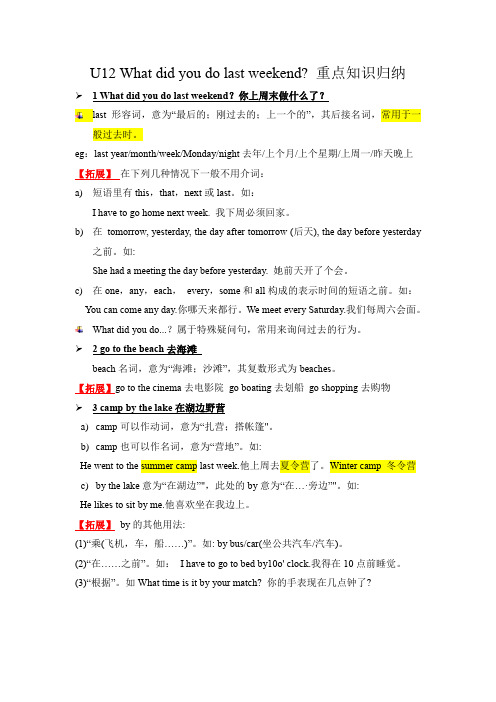
U12 What did you do last weekend? 重点知识归纳1 What did you do last weekend?你上周末做什么了?last形容词,意为“最后的;刚过去的;上一个的”,其后接名词,常用于一般过去时。
eg:last year/month/week/Monday/night去年/上个月/上个星期/上周一/昨天晚上【拓展】在下列几种情况下一般不用介词:a)短语里有this,that,next或last。
如:I have to go home next week. 我下周必须回家。
b)在tomorrow, yesterday, the day after tomorrow (后天), the day before yesterday之前。
如:She had a meeting the day before yesterday. 她前天开了个会。
c)在one,any,each,every,some和all构成的表示时间的短语之前。
如:You can come any day.你哪天来都行。
We meet every Saturday.我们每周六会面。
What did you do...?属于特殊疑问句,常用来询问过去的行为。
2 go to the beach去海滩beach名词,意为“海滩;沙滩”,其复数形式为beaches。
【拓展】go to the cinema去电影院go boating去划船go shopping去购物3 camp by the lake在湖边野营a)camp可以作动词,意为“扎营;搭帐篷"。
b)camp也可以作名词,意为“营地”。
如:He went to the summer camp last week.他上周去夏令营了。
Winter camp 冬令营c)by the lake意为“在湖边”",此处的by意为“在…·旁边”"。
2019-2020年人教版英语七年级下册Unit-12-What did you do last w

( )1.A. summer B. month C. weekday D. weekends( )2.A. a lot B. a lots of C. a lot of D. lot of( )3.A. zoo B. park C. bank D. library( )4.A. tigers B. people C. friends D. animals( )5.A. dangerous B. friendly C. interesting D. ugly( )6.A. houses B. buildings C. cages D. ponds(池塘)( )7.A. angry B. happy C. friendly D. boring( )8.A. looking B. seeing C. watching D. hearing( )9.A. in B. at C. with D. on( )10.A. friendly B. interesting C. warm D. coldⅥ.阅读理解(共15小题,每小题2分,共30分)AJim is an English boy. He comes to China with his father and mother.They comehere to work. Jim comes here to study. He is in No. 15 Middle School. He gets up early every day. He is never late for school. He studies hard.He can read and write English well. He often helps us with our English, and we often help him with his Chinese. After class, he li kes playing football, swimming,running, jumping and riding. He makes many friends here. We’re very glad tostay with him. On Sundays, he often helps his mother clean the house, mendsomething or do the shopping. He likes Chinese food very much.He likes living here. He likes the Chinese students very much. We all like him, too.阅读短文,判断正(T)误(F)。
人教版 七年级英语(下册) Unit 12 What did you do last weekend(2019年春)

Unit 12What did you do last weekend?Section A【重点单词】1.camp v.扎营;搭帐篷ke n.湖;湖泊3.beach n.海滩;沙滩4.sheep n.羊;绵羊5.as prep.& ad v.作为;当作6.natural adj.自然的7.visitor n.游客;访问者8.tired adj.疲倦的;疲劳的9.stay v.停留;待10.away ad v.离开;远离11.mouse n.老鼠;耗子12.baby adj.幼小的n.婴儿13.shout v.呼叫;喊叫nguage n.语言【单词变形】1.beach—beaches(复数)2.sheep—sheep(复数)3.butterfly—butterflies(复数)4.mouse—mice(复数)5.baby—babies(复数)6.visit—visitor(名词)7.tell—told(过去式)8.shout—shouted(过去式)9.tire—tired(形容词)疲倦的—tiring(形容词)令人疲劳的10.natural—nature(名词)自然【重点短语】st weekend上周末2.go boating去划船3.camp by the lake湖畔扎营4.play badminton打羽毛球5.feed sheep喂羊6.as a guide作为一名导游7.butterfly house蝴蝶馆8.tell sb. about…告诉某人关于……9.one's living habits某人的生活习惯10.have a good weekend度过一个愉快的周末11.stay up late深夜不睡;熬夜12.run away跑开13.go with sb.和某人一起去14.shout at…冲……大声叫嚷【重点句型】1.——你上周末做什么了,露西?——周六早上我打羽毛球了。
2019-2020年人教版英语七年级下册Unit 12 What did you do last w

go to the summer camp
They
go toNew York City
They
go toNew York City
He
stay at home
She
visit her uncle
Homework
Unit12
go - went Sara went to the movies last Saturday
3. Say the dialogue in the picture with a student,Do a second example to the class.
4. Have students work in pairs.As they talk,move around the room monitoring their work.Offer language or pronunciation support as needed.
Summary Grammar Focus
1. Review the grammar box. Ask Ss to say the questions and answers.
2. Review the difference between regular –ed past tense verbs (stay –stayed, visited). Then say the past form sentences with the form below.
B:Yes,I did. No, I didn’t.
难点
Use the language to talk about past events.
教学步骤
教学内容安排
教学教法设计
2019-2020年人教版英语七年级下册Unit 12 What did you do last w
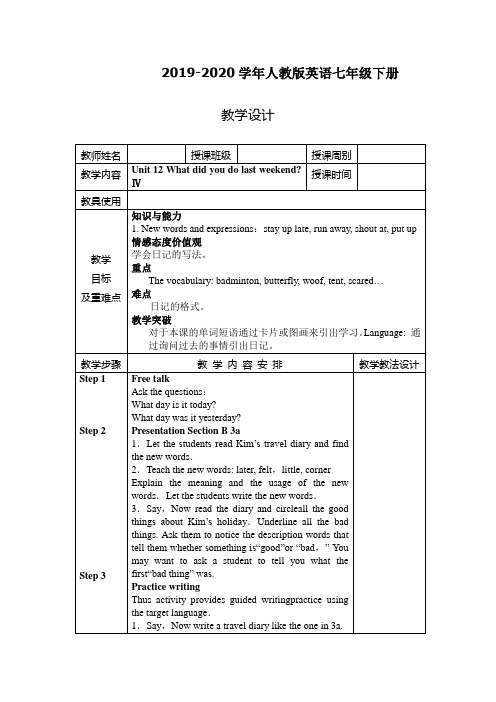
教学内容安排
教学教法设计
Step 4
Steቤተ መጻሕፍቲ ባይዱ 5
3.Have several students read out their diaries to the class(You might want to make this activity more substantial, and set it as written homework to be collected and marked.)
2019-2020学年人教版英语七年级下册
教学设计
教师姓名
授课班级
授课周别
教学内容
Unit12Whatdid youdo lastweekend?Ⅳ
授课时间
教具使用
教学
目标
及重难点
知识与能力
1. New words and expressions:stay up late, run away, shout at, put up
Groupwork
This activity gives students listening and speaking practice using the target language.
1 Say, Now you can talk about a real vacation or an imaginary one. The other students can ask you questions. You can use the diary you wrote for activity 3b if you want.
3. Move around the room, offering vocabulary and pronunciation support as needed.
- 1、下载文档前请自行甄别文档内容的完整性,平台不提供额外的编辑、内容补充、找答案等附加服务。
- 2、"仅部分预览"的文档,不可在线预览部分如存在完整性等问题,可反馈申请退款(可完整预览的文档不适用该条件!)。
- 3、如文档侵犯您的权益,请联系客服反馈,我们会尽快为您处理(人工客服工作时间:9:00-18:30)。
?
第课时
本单元继续学习一般过去时态,以周末生活为话题,谈论周末所发生的事情以及自己的感受。
此类作文当然也是以记叙文为主,叙述周末做过哪些事情。
因此掌握本单元中的重要短语及相关句型,都是写好此类作文的关键。
Ⅰ.相关短语积累。
.放风筝
.生火
.去划船
.去野营
.搭帐篷
.打羽毛球
.去看电影
.做我的家庭作业
.周末过得愉快
.在游泳池游泳
Ⅱ.相关表达积累。
.你和谁去的?
?
.我在……做导游。
…
.周末你过得愉快吗?
?
.星期六上午,我做了……
…
.这确实是一个……的周末。
…
Ⅲ.相关佳句积累。
. !
. ?
., .
. , .
. .
请根据下面表格中的提示用英语写一篇词左右的短文,介绍你是如何度过上个周末的。
周六
上午参观消防站
下午去钓鱼
晚上看电视
周日
上午画画
下午探望爷爷奶奶
【思路点拨】
本篇短文是一篇记叙文。
根据表格中提示的内容可知,此记叙文是要讲述笔者的上一个周末是如何度过的,且短文是按照时间的先后顺序进行叙述的。
写作时,可以依次叙述周六和周日这两天的各个时间段所发生的事情,叙述完后再表达自己过完这个周末的感受。
写作时注意主语要使用第一人称且动词全部采用过去时态。
